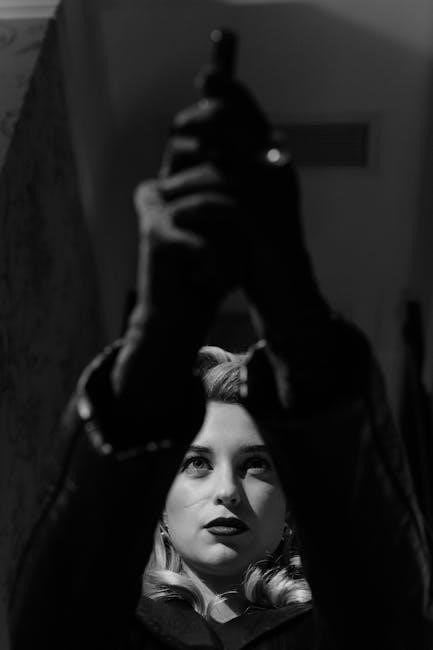Trevor Noah’s memoir, Born a Crime, recounts his extraordinary childhood in apartheid South Africa, where his mixed heritage made his existence a defiance of the law. Through vivid storytelling, Noah explores themes of identity, race, and resilience, offering a powerful lens into South Africa’s troubled past and its enduring impact on society today.
1.1 Overview of the Book
Born a Crime is a memoir by Trevor Noah that recounts his childhood in apartheid South Africa. The book explores themes of identity, race, and resilience through a series of vivid anecdotes. Noah’s mixed heritage, born to a black mother and white father during a time when such unions were illegal, forms the core of his story. With humor and raw honesty, he narrates his experiences growing up in Soweto, navigating a society defined by segregation and violence, and finding his place in a fractured world.
1.2 Trevor Noah’s Background and Inspiration
Trevor Noah’s background as a biracial child in apartheid South Africa shaped his perspective and inspired his memoir. Born to a black mother and white father, his existence was illegal under apartheid laws. This unique position fueled his storytelling, blending humor with poignant reflections on race, identity, and belonging. Noah’s experiences in Soweto and his mother’s resilience served as the foundation for his writing, offering a personal yet universal narrative about navigating a divided world.

Historical Context of Apartheid South Africa
Apartheid South Africa was a nation divided by race, enforced by oppressive laws that segregated and disenfranchised non-whites, creating a society of deep inequality and resistance.
2.1 The Legal and Social Landscape of Apartheid
Apartheid was a system of institutionalized racial segregation in South Africa, enforced through laws like the Population Registration Act and the Group Areas Act, which classified people by race and restricted their movements and rights. Socially, it created a hierarchy that privileged whites while marginalizing Black, Colored, and Indian populations, leading to widespread inequality, poverty, and violence. This oppressive structure shaped Trevor Noah’s early life and identity in profound ways, as described in his memoir.
2.2 Racial Segregation and Its Impact on Daily Life
Racial segregation under apartheid infiltrated every aspect of daily life, enforcing strict divisions between Black, White, Colored, and Indian populations. Laws dictated where people could live, work, and attend school, fostering inequality and poverty. Public services and opportunities were starkly unequal, with Black communities facing severe discrimination. This systemic oppression created a climate of fear, mistrust, and limited opportunities, shaping Trevor Noah’s experiences growing up in Soweto and his struggles with identity and belonging in a deeply divided society.

Trevor Noah’s Early Life and Identity
Trevor Noah was born to a white father and a black mother in apartheid South Africa, where his mixed heritage made his birth illegal. Raised in Soweto, he navigated a world where his identity constantly challenged societal norms, shaping his perspective on race, belonging, and resilience in a deeply divided nation.
3.1 The Significance of His Mixed Heritage
Trevor Noah’s mixed heritage was a direct defiance of apartheid laws, making his existence illegal; His black mother and white father’s union was a crime, symbolizing resistance against a system designed to enforce racial segregation. This illicit beginning shaped Noah’s identity, teaching him to navigate multiple worlds and understand the complexities of race, culture, and belonging in a society that sought to categorize and control. His heritage became a catalyst for his unique perspective on life and societal norms.
3.2 Growing Up in Soweto and Its Challenges
Growing up in Soweto, Trevor Noah faced the harsh realities of poverty and violence under apartheid. Soweto, a sprawling black township, was marked by overcrowding, limited resources, and constant danger. Trevor navigated a world where crime and instability were rampant, yet the community’s resilience and camaraderie provided a fragile sense of normalcy. His experiences in Soweto shaped his worldview, teaching him to adapt and survive in a society designed to marginalize those like him. The challenges of Soweto became the foundation of his story.
The Role of Trevor’s Mother
Trevor Noah’s mother was his anchor, providing unwavering support and resilience amidst South Africa’s turmoil. Her fierce protection and determination shaped his identity and survival.
4.1 Her Influence on Trevor’s Resilience
Trevor Noah’s mother played a pivotal role in fostering his resilience. Her unwavering determination and courage in the face of adversity instilled in him the strength to navigate a society fraught with racial tension and legal barriers. Despite the challenges posed by apartheid, she taught him to embrace his identity and find humor in the darkest moments, laying the foundation for his future success and ability to thrive in a world that often sought to marginalize him.
4.2 Her Struggles and Determination to Protect Trevor
Trevor Noah’s mother faced immense struggles to protect him from the harsh realities of apartheid. As a black woman raising a mixed-race child in a society that criminalized their existence, she risked everything to ensure his safety and well-being. Her determination was evident in her unwavering commitment to shield him from violence and poverty, often putting her own life in danger to provide him with opportunities for a better future.

Themes in “Born a Crime”
Trevor Noah’s memoir explores themes of identity, race, and belonging, weaving humor with accounts of poverty, violence, and survival, offering a poignant reflection on apartheid’s legacy.
5.1 Identity, Race, and Belonging
Trevor Noah’s memoir delves into his struggles with identity, race, and belonging in apartheid South Africa. Born to a black mother and white father, Trevor navigates a world where his mixed heritage makes him an outcast. He grapples with societal expectations, racial classifications, and the search for acceptance. Through his experiences, Noah highlights the complexities of identity in a deeply divided world, offering a raw yet relatable exploration of self-discovery and the quest for belonging.
5.2 Poverty, Violence, and Survival
Trevor Noah’s memoir vividly portrays his upbringing in poverty-stricken Soweto, where violence and survival were constant realities. His mother’s unwavering determination to protect him from both societal dangers and personal threats shaped his resilience. The minibus incident, among other harrowing experiences, highlights the precarious nature of life under apartheid, where daily survival often depended on wit and courage. Noah’s narrative underscores the harsh realities of growing up in a world defined by inequality and violence, yet infused with hope and defiance.
5.3 Humor as a Coping Mechanism
In Born a Crime, Trevor Noah uses humor as a powerful tool to navigate the harsh realities of his childhood. His witty observations and comedic storytelling transform painful memories into relatable and even laughable moments. This approach not only highlights his resilience but also serves as a universal coping mechanism, allowing readers to connect with his experiences on a deeper level. Noah’s humor becomes a bridge between the absurdity of apartheid and the humanity of his story, making the narrative both poignant and uplifting.

Key Anecdotes and Stories
Trevor Noah shares vivid stories, such as the minibus incident, which highlight his precarious childhood and the dangers of navigating apartheid South Africa.
6.1 The Minibus Incident and Its Aftermath
In Born a Crime, Trevor Noah recounts a harrowing minibus incident where his family faced violent gangsters. This dangerous encounter underscores the risks of using unregulated transport in apartheid South Africa. Trevor vividly describes the fear and chaos, highlighting his mother’s quick thinking and determination to protect him. The incident reflects the broader challenges of navigating a perilous and unpredictable world, shaping Trevor’s understanding of survival and resilience in a fractured society.
6.2 Trevor’s Experiences with Religion and Culture
Trevor Noah’s memoir delves into his diverse religious and cultural experiences, shaped by his mother’s strong Christian faith and the multicultural fabric of South Africa. He humorously recounts attending multiple churches, blending African traditions with Christian practices. These experiences highlight his struggle to find belonging amidst conflicting identities, while also showcasing the vibrant cultural tapestry of Soweto. Noah’s storytelling weaves humor and introspection, illustrating how religion and culture profoundly influenced his worldview and sense of self.

The Structure and Style of the Book
Born a Crime is structured as a collection of anecdotes, blending humor with poignant reflections on race, identity, and survival. Noah’s conversational style makes the memoir deeply relatable, while his storytelling techniques highlight the absurdities of apartheid, creating a narrative that is both personal and universal. His use of humor underscores the resilience needed to navigate a fractured world, making the book both entertaining and impactful.
7.1 Narrative Style and Storytelling Techniques
Trevor Noah employs a conversational and introspective narrative style in Born a Crime, making the memoir feel deeply personal. His storytelling techniques, such as vivid descriptions of Soweto and relatable anecdotes, bring apartheid’s complexities to life. Noah seamlessly interweaves humor with raw honesty, creating a tone that is both humorous and haunting. This approach not only engages readers but also underscores the resilience and hope that defined his upbringing, making the narrative both compelling and thought-provoking.
7.2 The Use of Anecdotes to Convey Broader Themes
Trevor Noah masterfully uses anecdotes in Born a Crime to illuminate broader societal themes. Stories like the chaotic minibus rides and his experiences with religion vividly depict the complexities of apartheid and cultural identity. These personal narratives not only entertain but also humanize the systemic issues of race, inequality, and survival. By weaving humor and vulnerability, Noah connects his unique childhood to universal struggles, making the memoir both deeply relatable and thought-provoking.
Reception and Impact of “Born a Crime”
Born a Crime received widespread critical acclaim for its raw honesty and humor, resonating globally. It has become a significant cultural and educational resource, sparking meaningful discussions on race, identity, and resilience.
8.1 Critical Acclaim and Reviews
Born a Crime has garnered widespread critical acclaim for its raw honesty, humor, and poignant storytelling. Critics praised Trevor Noah’s ability to weave personal anecdotes with broader societal commentary, making the memoir both deeply personal and universally relatable. The book has been celebrated for its unflinching portrayal of apartheid’s legacy and its exploration of identity, race, and resilience. Its emotional depth and comedic undertones have made it a standout work in contemporary memoir literature.
8.2 The Book’s Cultural and Social Impact
Born a Crime has left an indelible mark on cultural and social discourse, sparking conversations about race, identity, and inequality. Its unflinching portrayal of apartheid’s aftermath has educated readers worldwide, fostering empathy and understanding. The memoir has been embraced in educational settings, encouraging discussions on systemic injustice and resilience. Trevor Noah’s story has inspired countless individuals, proving the power of personal narratives to challenge societal norms and promote change. Its impact continues to resonate globally, bridging cultural divides through shared human experiences.

Educational and Discussion Value
Born a Crime is widely taught in schools, offering insights into apartheid, race, and identity. Its vivid storytelling sparks discussions on inequality, resilience, and cultural understanding, making it a valuable educational resource.
9.1 Why the Book is Taught in Schools
Born a Crime is widely incorporated into school curricula for its exploration of race, identity, and resilience. Its personal anecdotes and historical context provide students with a vivid understanding of apartheid’s impact. The book’s accessible storytelling style makes complex societal issues relatable, fostering empathy and critical thinking. Themes of self-discovery and survival resonate universally, encouraging discussions about inequality and cultural understanding. Its inclusion in educational programs highlights its value as a tool for teaching tolerance and global awareness.
9.2 Discussion Prompts for Readers
How does Trevor’s mixed heritage influence his identity and experiences in apartheid South Africa? What role does humor play in coping with adversity? How does Trevor’s mother shape his resilience and worldview? What insights does the book offer into the societal impact of apartheid? How does Trevor navigate cultural and racial divides? What lessons can readers draw from his journey about prejudice, survival, and self-discovery? These prompts encourage deeper reflection on the book’s themes and relevance to global issues.
Born a Crime leaves a lasting impression, highlighting Trevor Noah’s journey from a turbulent childhood to global success, showcasing resilience and the power of storytelling in understanding identity and societal change.
10.1 The Legacy of “Born a Crime”
Trevor Noah’s Born a Crime has left an indelible mark on literature and society. Its raw honesty and humor have sparked global conversations about race, identity, and resilience. The memoir’s ability to blend personal anecdotes with broader societal themes has made it a significant work, educating readers about apartheid’s legacy while inspiring hope and understanding. It remains a powerful testament to the human spirit’s capacity to overcome adversity.
10.2 Trevor Noah’s Journey Beyond the Book
Beyond Born a Crime, Trevor Noah has become a global figure, using his platform to address social issues. As host of The Daily Show, he leverages humor to highlight injustices, expanding his influence. His journey reflects a commitment to storytelling and advocacy, inspiring millions worldwide. Noah’s evolution from a South African childhood to international acclaim underscores his ability to connect across cultures, making him a pivotal voice in contemporary discourse.